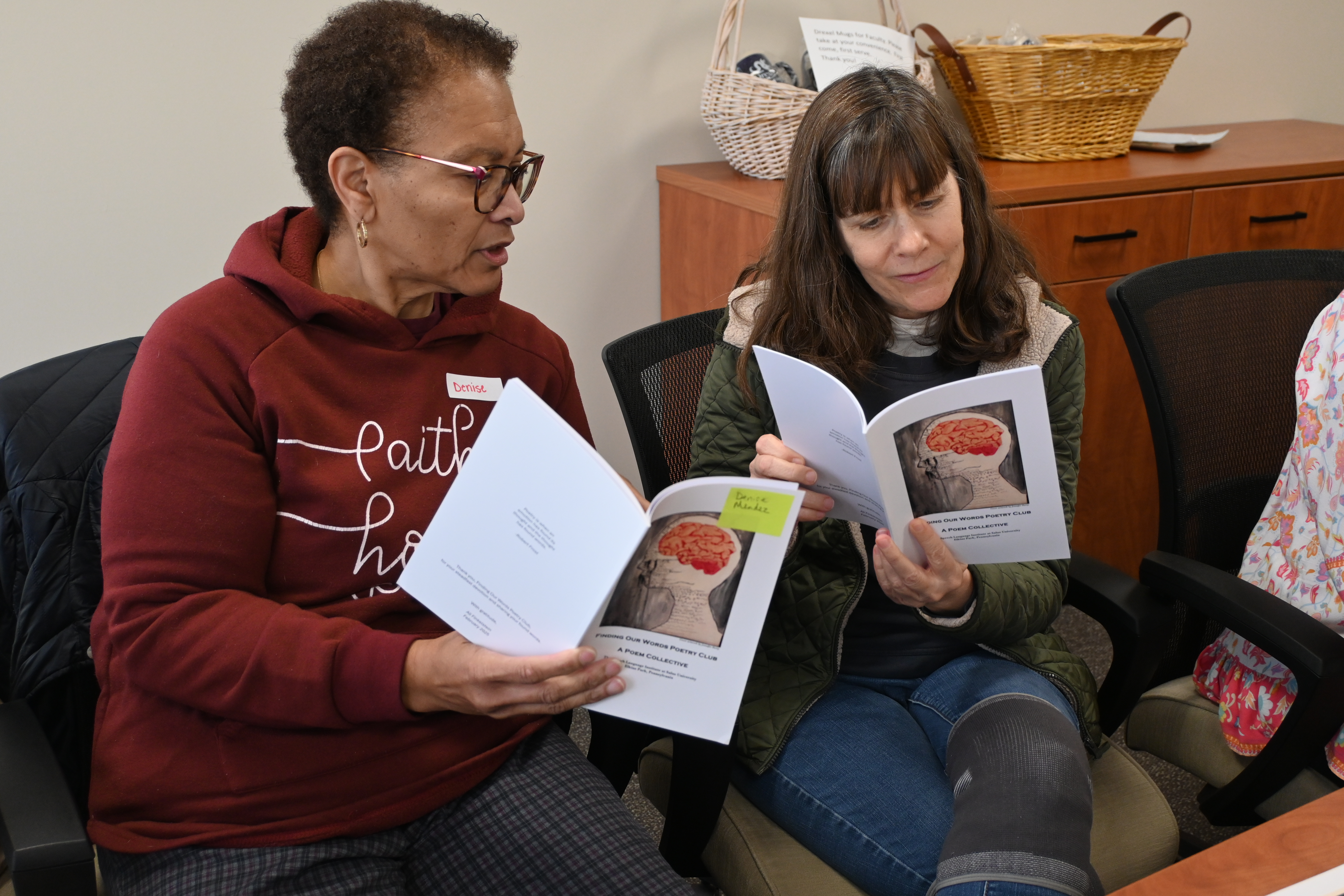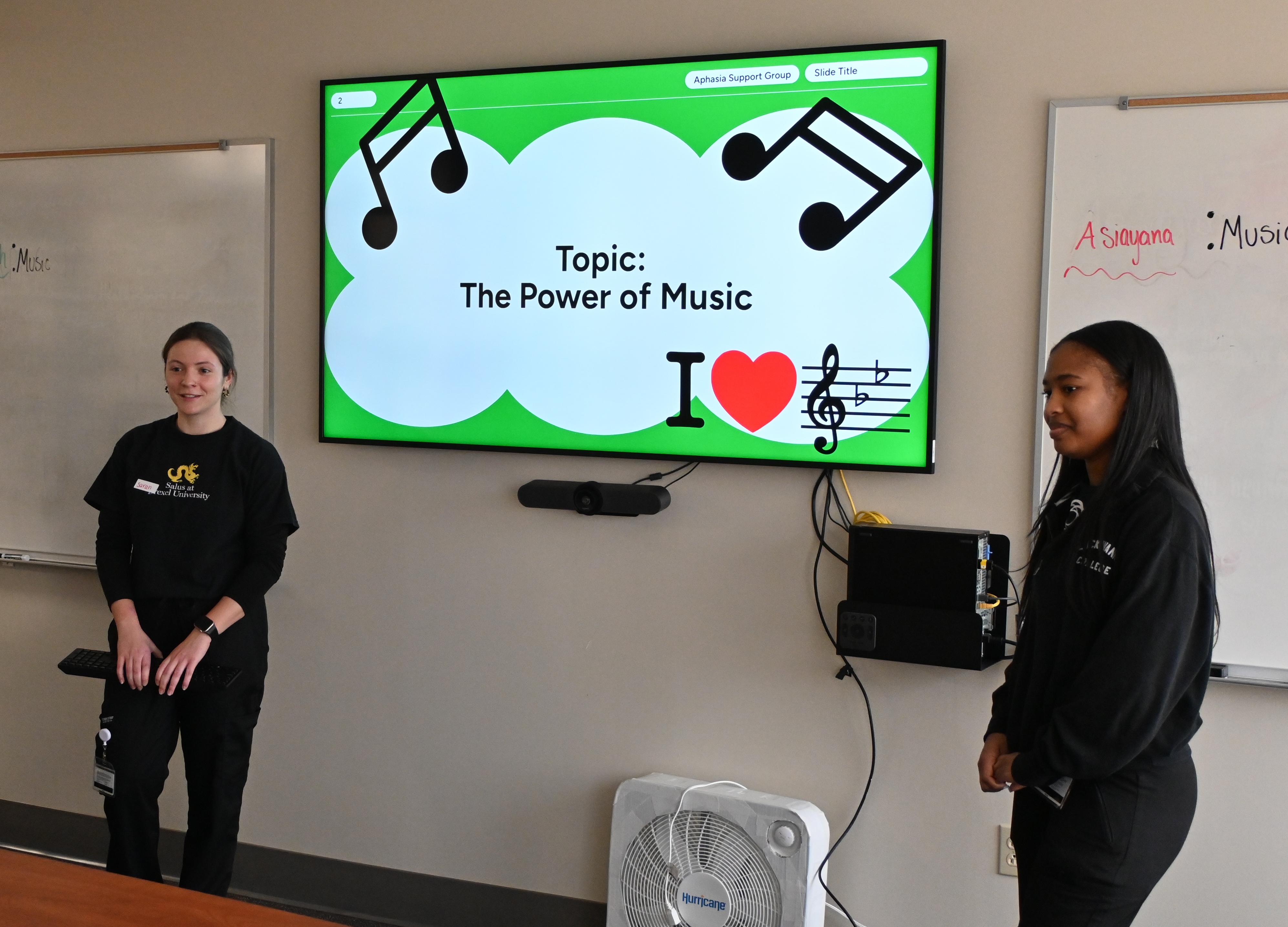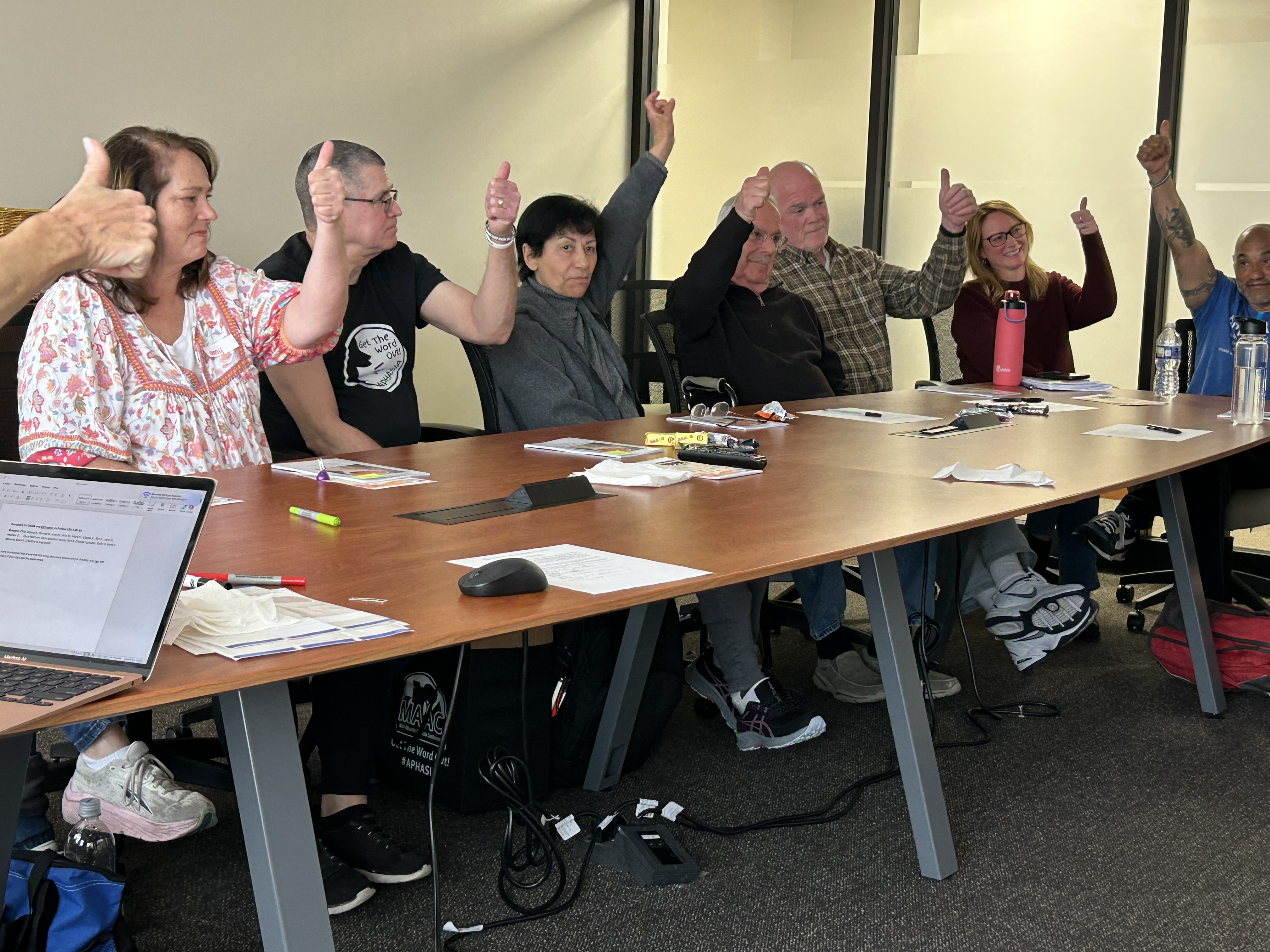Clients Praise the Speech-Language Institute’s Social Communication Groups

The Speech-Language Institute (SLI), Salus at Drexel University, provides three social communication groups for individuals living with aphasia: Aphasia Support Group, Read Between the Lines Book Club, and Finding Our Words Poetry Club.
According to the National Aphasia Association, aphasia is a disorder of language, not intelligence. It affects how a person communicates. It usually happens suddenly after a stroke or head injury and can impact one’s speech, as well as the way one writes and understands both spoken and written language.
In the Aphasia Support Group — a National Aphasia Association affiliate for adults with language impairments due to stroke or brain injury — at SLI, clients can use their social communication and problem-solving skills in a supportive setting while discussing topics such as self-care, relationships, managing emotions, and aphasia advocacy.
The Read Between the Lines Book Club offers clients who can read at a story level or higher the chance to engage in chapter-by-chapter discussions of selected books. Students prepare supportive worksheets and slides to enhance the experience and facilitate discussion.
The Finding Our Words Poetry Club fosters creativity as a form of communication, even for clients with limited verbal expression. Students assist in reading and writing poetry through guided instruction and creative prompts.
“The students in all of the groups learn not only how to educate and facilitate but come away with a greater understanding of how our clients living with aphasia participate in life and manage in the real world,” said Ali Finkelstein, MA, CCC-SLP, clinical educator in the SLI who started the Aphasia Support Group in 2017, the Book Club in 2021 and the Poetry Club in 2023. “Our clients benefit from all of the groups and the students come away thankful for the opportunity to learn more about living with aphasia from our clients, so it’s truly a symbiotic relationship.”
There are many success stories from the clients. We spoke with four members of different aphasia support groups to learn how the groups have made a difference for them. Here’s what they shared:
Dr. Denise Mendez: It’s First-Class Therapy
In 2018, Dr. Denise Mendez had a stroke. At the time, she worked for the Abington, Pennsylvania, School District in various positions ranging from Special Education coordinator to the district’s coordinator of mathematics. But early on in her post-stroke journey — which included four brain bleeds and a craniotomy — Dr. Mendez was experiencing very little socialization.
 Joining the SLI Aphasia Support Group worked well for her because everybody in the room understood what she was going through.
Joining the SLI Aphasia Support Group worked well for her because everybody in the room understood what she was going through.
“The words I would normally use to express what I want to say, sometimes I can’t find exactly the words I want. That used to freeze me up and I just wouldn’t say anything,” she said. “My thoughts go everywhere, so I need to be able to talk and focus. The supervisors at SLI get it, and they make sure the students get it. And, when the students speak with you, they know how to speak with you respectfully. This is first-class therapy. It’s focused on me and my goals. My brain and my mouth are going at the same speed.”
She added the support groups also offer a safe place to be oneself, to express oneself, however one can do that. Everybody has space and everybody is welcome. “And, they present good topics — things like perseverance, resiliency, self-care, resolutions — people can be real and say what they’re really feeling. These are people who get you,” she said.
Jenn Derry: Warm-Hearted and Positive People
Jenn Derry joined her first aphasia support group about a year after her stroke. She recalls how nervous she was at the first meeting she attended — she had lost her confidence and was sobbing. But those feelings of uneasiness quickly subsided. She found the faculty, Master of Science students, and other group members warm-hearted, considerate, and with positive attitudes and approaches.
“A year after my stroke, I started painting. I had never painted before my stroke. I wanted to find a way to express myself,” said Derry. “I decided to show my paintings at the Aphasia Support Group. The first time, it was a deep, empowering experience to share and discuss the group’s thoughts and feelings.”
Every month, Derry attends in person or joins virtually. While she has participated in other book and poetry clubs, she prefers the clubs at SLI.
“They are incredibly supportive, stimulating, and truly rewarding,” said Derry. “I like that they give us background characters, summaries of each section, challenging vocabulary, chapter specifics, and discussion points a few days before the meeting so that we can discuss them. That helps a lot for my comprehension and communication skills.”
Ann Rossi: No Longer Alone
At the age of 19, in her sophomore year of college, Ann Rossi suffered an arteriovenous malformation (AVM) brain hemorrhage — a tangle of abnormal blood vessels that can rupture and cause bleeding in the brain. She lost her ability to do everything but walk. In the months and years that followed, she regained her cognitive ability to write and speak. Although she tried and tried, Ann was unable to read for 33 years.
 She joined the Aphasia Support Groups at SLI and found there was no pre-judgment from the members, the faculty, or the students.
She joined the Aphasia Support Groups at SLI and found there was no pre-judgment from the members, the faculty, or the students.
“I always felt judged in the past,” said Rossi. “I feel a relatability with the other people who also have aphasia. It is a really good feeling when you have felt completely alone for 34 years.”
Rossi said she has gotten a lot out of the SLI support groups and always highly recommends it to others who could benefit from them.
“I have been doing Read Between the Lines Book Club as well as Finding Our Words Poetry Club,” she said. “I believe that poetry has boosted my ability to read, improved my memory, strengthened my word-finding, and I’m surprising myself with a better vocabulary.”
Mark Harder: ‘I Feel Safe’
Mark Harder really didn’t want to participate in the Read Between the Lines Book Club at SLI. Reading has been difficult for him since he suffered a stroke in 2018. In fact, reading is still a challenge.
Harder was looking for an aphasia support group because he wanted to get better and learn more about other people with aphasia. In the SLI groups, he found a camaraderie and mutual understanding between the aphasia clients and the SLI faculty and students.
“I feel safe during the sessions,” said Harder. “I could only read one or two pages a day, but now I can read 10 or more pages a day,” he said.
Harder admits each day is still a challenge, but he strives to get better. “The Aphasia Support Group, book club, and poetry club make me think. The sessions help my brain get better,” he said.
The groups come with his highest recommendation.
“I enjoy it, and I think others would enjoy it, too,” said Harder.
